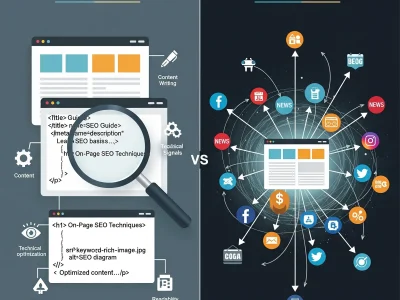On-Page SEO vs Off-Page SEO: Key Differences Explained
On-Page SEO vs Off-Page SEO is one of the most discussed topics in digital marketing, as both are essential for achieving strong search rankings and driving online visibility. While on-page strategies focus on optimizing the content and structure within your website, off-page techniques are designed to build authority and trust beyond your site. Together, they form the foundation of effective SEO techniques and SEO best practices that can help businesses grow online.

Understanding On-Page SEO vs Off-Page SEO
To understand On-Page SEO vs Off-Page SEO, it’s important to know how they complement each other. On-page optimization deals with elements like meta titles, headers, keyword usage, internal links, and content quality. These aspects directly impact how search engines read and rank your web pages.
Unlike on-page work, off-page SEO deals with efforts carried out beyond your website. This includes building backlinks, engaging on social platforms, and creating brand awareness through digital channels. When used together, both approaches enhance your site’s visibility, relevance, and authority in search results.
Why SEO for Businesses is Essential
On-Page SEO vs Off-Page SEO begins with strengthening on-page efforts because they act as the foundation of your website’s performance. Good on-page SEO ensures that search engines can easily crawl and understand your content. Clear site architecture, fast loading speed, optimized images, and structured headings are all part of this process.
Additionally, producing high-quality, relevant content with proper keyword placement attracts the right audience. When your website answers user questions effectively, it improves engagement and reduces bounce rates. These factors signal to search engines that your site deserves higher rankings.
Why Off-Page SEO Is Equally Important
While on-page SEO improves your website from the inside, off-page SEO builds credibility from the outside. It revolves around establishing your website as a trusted authority in your industry. Links from trusted domains work as signals, proving to search engines that your content is useful and credible.
Social signals, such as shares and engagement on platforms, also play a role in boosting visibility. In addition, mentions of your brand on digital channels boost recognition and trust. Without firm off-page efforts, even well-built sites may find it tough to compete in crowded markets.
On-Page SEO Techniques for Better Rankings
Implementing on-page SEO techniques is crucial for any website looking to attract organic traffic. Begin with keyword research to discover phrases your potential audience is actively looking for. Use these naturally in your headings, meta descriptions, and body content.
Other key techniques include:
- Creating descriptive URLs with relevant keywords.
- Using internal links to guide visitors and distribute link equity.
- Optimizing images with alt text to enhance accessibility and search understanding.
- Ensuring mobile-friendliness for seamless browsing across devices.
When executed consistently, these SEO techniques create a strong foundation for better rankings and improved user experience.
Off-Page SEO Best Practices for Authority Building
Just as on-page SEO focuses on optimization within your site, off-page SEO requires following SEO best practices outside your domain. Link building remains one of the most effective strategies. However, the quality of backlinks matters more than quantity. Seek partnerships, guest posting opportunities, and niche-specific mentions from trusted websites.
Engaging in influencer collaborations, participating in industry forums, and leveraging PR campaigns are also strong methods to boost credibility. Furthermore, sharing valuable content across social media platforms increases reach and drives referral traffic back to your website.
These off-page strategies show search engines that your site is not only optimized but also recognized by others as authoritative.
Balancing On-Page SEO vs Off-Page SEO
The real power of On-Page SEO vs Off-Page SEO lies in their balance. A website that is optimized internally but lacks external trust signals may fail to reach its full potential. Similarly, a website with backlinks but poor content may not convert visitors effectively.
For the best results, businesses must integrate both approaches. Start with solid on-page optimization to ensure a smooth, user-friendly website. Next, enhance your campaigns with off-page tactics that grow trust, recognition, and lasting authority. This balanced approach represents true SEO best practices.
Common Mistakes to Avoid
When focusing on On-Page SEO vs Off-Page SEO, many businesses make mistakes that limit their success. Some of these include:
- Overusing keywords, which can hurt rankings.
- Building low-quality backlinks that damage authority.
- Ignoring technical SEO aspects like page speed and mobile optimization.
- Producing thin or duplicate content with little value.
Avoiding these mistakes ensures your SEO techniques deliver sustainable growth rather than short-term gains.
Conclusion
In conclusion, On-Page SEO vs Off-Page SEO highlights the importance of using both strategies together for online success. On-page efforts make your website search-engine friendly and user-focused, while off-page practices build trust, reputation, and authority in your industry. By applying SEO techniques and following SEO best practices, businesses can improve visibility, attract quality traffic, and achieve long-term digital growth.
👉 Take your SEO journey further with WebRocket AI, where expert strategies ensure your business reaches the right audience, ranks higher, and grows faster in today’s competitive market.
FAQs
On-page SEO refers to optimizations made directly on your website, while off-page SEO involves strategies outside your site, such as link building and brand mentions.
Both are essential because on-page SEO improves user experience and content quality, while off-page SEO builds authority and credibility in search rankings.
Effective techniques include keyword research, optimized titles and headings, internal linking, descriptive URLs, mobile responsiveness, and image optimization.
Best practices include earning high-quality backlinks, engaging in social media promotion, collaborating with influencers, and participating in industry communities.
Most businesses notice improvements within three to six months, depending on competition, strategy, and consistency of execution.
